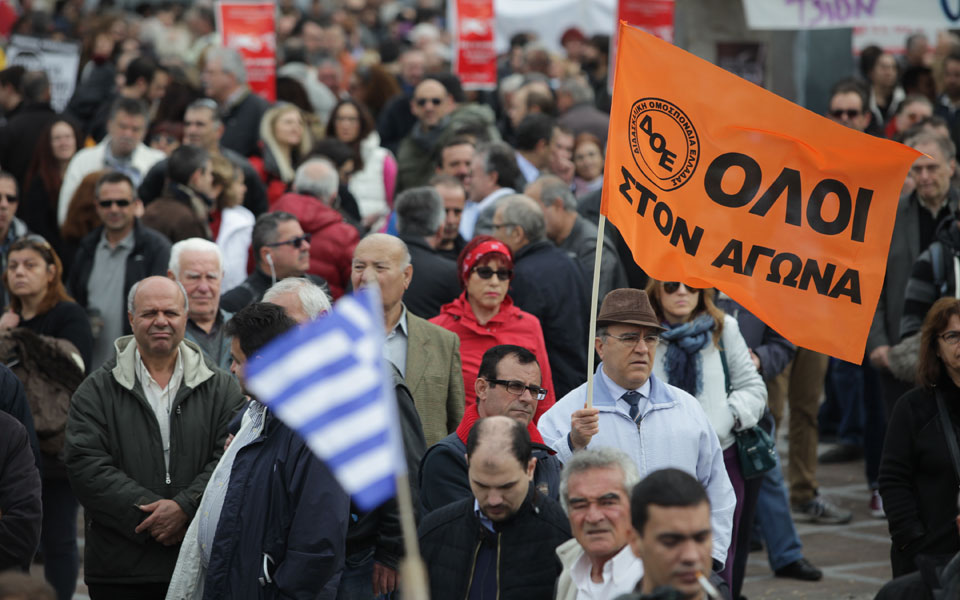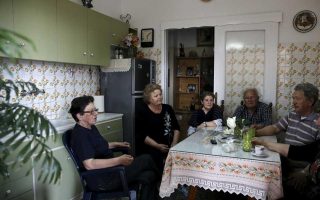Gov’t cohesion is at stake in bailout review

The government is trying to navigate through rough waters while under pressure mainly from farmers and some other professional groups on the one hand and the creditors on the other. The markets have taken notice, with the Athens stock exchange shedding some 20 percent since the start of the year, and bonds underperforming.
At this point, it looks as if negotiations could go on for weeks or even months although the leftist-led government would like to close the first review of the program soon. Undoubtedly, the political risk is on the rise. However, it may be more about the composition of the government’s majority in Parliament, assuming it is committed to implementing the program.
The first round of talks between the lenders’ representatives and the government in the context of the first review of the third Greek bailout program have ended, as expected, without an agreement. The distance between the two sides on the fiscal gap, pension reform and taxation appears not to be small. Therefore it is likely that negotiations could extend into March or even beyond although the government hopes to reach an agreement and pass the relevant omnibus bill in Parliament by early March at the latest. This is because it senses that the more the negotiations drag on, the bigger the political cost and the greater the pressure will be on some SYRIZA deputies elected in rural areas not to go along.
It is a well-known secret that protesting farmers have until the end of the month to press hard and get a better deal on taxes and pensions. Till then, they can spend time on roadblocks instead of cafes, drinking coffee and playing cards as they usually do during January and February. From March, they will have to get back to work on their farms so their “revolutionary” spirit will give way to more personal interests.
For its part, the leftist-led government seems to be willing to wait it out and not intervene with riot police to open roads or border custom checkpoints unless it becomes imperative. It is no coincidence that the SYRIZA party has officially supported the strikes and other protests, suggesting they were directed against the measures demanded by the creditors that the government is hard-pressed to take. Some SYRIZA party operatives have even suggested in private that they were in control of the situation, and demonstrations along with road blockades were welcome because they could be used by the government as a bargaining chip in the negotiations with the institutions. If that were indeed the idea, it obviously did not work.
By looking at the fiscal and pension reform proposals, it is easy to detect an effort on the part of the government to rely more on taxes and social security contributions on the one hand and push other measures down the road on the other. In the case of pension reform, the government’s proposal penalizes current employees via an increase in contributions and future pensioners via bigger pension cuts than the existing pensioners. This approach is consistent with the widely held belief that Greeks have a short memory and the political impact will be contained as long as it does not hurt their pockets now.
The 2016 budget, which includes fiscal actions amounting to 5.75 billion euros for this year and 2017, is consistent with the government’s ideological belief. Taxes and all kind of levies stand at 3.2 billion euros whereas spending cuts are at about 2.5 billion. However, this picture is misleading since an increase in social security contributions equal to 1.1 billion euros is categorized as spending cuts.
Nevertheless, the measures have a political cost which will likely get bigger if the negotiations with the lenders drag on. Since elections are almost three and a half years away under normal circumstances, the government wants to stay in power and has repeatedly signaled its commitment to implement the program, the political cost could well translate into changing the composition of the government’s majority in Parliament.
It is clear that leftist SYRIZA is comfortable with the populist, right-wing ANEL (Independent Greeks) – they control 153 seats between them – because the latter does not intervene in policy matters other than national defense. However, this may not be the case if SYRIZA has to share power with other center-leftist parties. If the deal with the lenders cannot get at least 151 deputies in the 300-seat Parliament, SYRIZA could be forced to do so to remain in power. Perhaps this is the biggest political pitfall of the negotiations that the ruling party wants to avoid.
[Kathimerini English Edition]





